SearchLove Conferences are famous for a number of things, ranging from the speaker quality, which is higher than what you see at perhaps 90% of similar shows, to its phenomenal parties. No matter what part you like more, you are sure to leave the conference with incredibly valuable ideas from people who are real experts in their field, who are passionate about their jobs and go really deep on their subject. In its 6th year, we were once again tremendously impressed with the lectures and overall atmosphere. It was great to see both familiar faces and new speakers and learn yet something more about the magic of SEO. After a short introduction by Duncan Morris, CEO of Distilled, the show got started with Wil Reynolds, Stephen Pavlovich and Hannah Smith giving their Live Site Reviews. They focused on three particular websites – firebrandtraining.co.uk, kopi.co.uk and superdry.com – and provided their expert opinions on both their pluses and minuses, after which the individual presentations started. The most frequently mentioned imperfections were missing credibility, no use of testimonials, confusing navigation or the importance of keyword research.
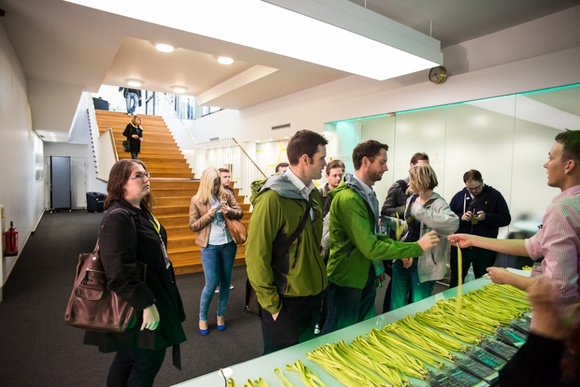
lanyards London Searchlove Conference 2012

searchlove book
The Life of An In-House SEO – Justin Briggs, Big Fish
Justin is a kind of guy who lets you feel that he puts real passion into his job. His real life tale focused on the importance of understanding the client. As he admitted, his career of a consultant was not successful, because he didn’t have the experience to fully empathize with his clients. However, the situation changed when he started working with in-house PR teams at Big Fish Games to help them build links and gain coverage. One of the things he learned over there was that it completing a single SEO task is a long-term goal, which takes on average 1.5 years. Improving the Big Fish Games’ website was a long process, which required relaunching platforms, complete redesign, content retargeting and precise link building. He particularly emphasized the crucial role of building relationships with communities, providing the highest quality customer service, responding to customers and things such as offering scholarships (no spam!), create sneak peeks, demos, brief descriptions, support the cause both formally and informally (e.g. in form of donations) or create temporal events for causes. And of course, you need to have fun doing it.

Justin Briggs
The Future of Small Business SEO – Guy Levine, Return On Digital

Guy Levine
Return On Digital’s CEO Guy Levine knows that he best kind of contents is the kind people want to or are reading currently. However, how to find out what people are interested in? Guy advised the audience to use the following research tools:
- Mintel Research, which is a high quality market research focusing on consumer trends, product innovation and competitive marketing strategies.
- Google Analytics to help you look for keywords.
- Yahoo Answers.
- MoneySavingExpert.com Forums where you can find all kind of useful stuff.
- Topsy, which gives you realtime insight from billions of conversation and allows you to see who is tweeting what.

audience SearchLove Conference
These tools can make your research easier, but that’s just the beginning. Once you are done with it, you need to start googling and “stalking” your competitors. After that, you are ready to analyze the data and execute the campaign. To stand out in terms of the search engine results pages (SERPs), he advises to:
- add little star ratings below your website address in Google organic search
- even an average looking picture is a great addition to your website, it makes it look much better
- picture beside your website in Google Search makes your website look more friendly
Beyond Linkbait: First Steps to a Content Strategy – Mark Johnstone, Distilled

Mark Johnstone and audience
The path from one-off linkbait to a successful content strategy is anything but easy. Even though producing a piece of link bait isn’t a content strategy (it is not really sustainable), being good at link bait definitely leads to a content strategy, or even better, it leads to campaign strategy creation. If you want great campaign, you need to have great ideas. How do you know if any idea is good, though? Mark gave a few tips on how to discern excellent ideas from those average:
- brainstorm
- get beyond the industry of SEO
- speak to journalists
- gather all the data available
- find something that interests you and ask a lot of questions
- use a checklist and if you find out that it is missing some part, go back to it and try to fix it
- do some pre-outreach to see if your idea will get accepted

Mark Johnstone
As an SEO consultant for Distilled, Mark knows that a successful idea needs to be easy to understand, interesting, credible, different, surprising and shareable. However, it can still fail if you choose a wrong format. An example of a different and shareable idea is infographic. Once you have the idea, you are ready to build a strategy. In this case, Google AdWords, Lifehacker or WordPress for small businesses can be really helpful.
Chasing Algorithms: Think Deviously, Act Angelic, and Never get Hit by a Penalty – Wil Reynolds, SEER Interactive

Wil Reynolds

Wil Reynolds and the audience
This lecture was my personal highlight of the conference. It was an excellent session, in which Wil offered us a non-techie view on protecting websites against the possibility of getting hit by a penalty and at the same time provided useful strategies to improve the level of protection. According to his own words, all website owners needs to be aware of potential risks and do everything to protect themselves against linking crappy microsites to both their website and sites of their clients. Otherwise, it may take years to build new links and improve their rankings as well as site’s reputation. Therefore, the most important pro tip we took from this lecture is: do RCS, do Real Company Stuff. Clean up your links, find the outbroken ones from competitors’ sites, find all 404s, because the fact that you did not get hit by a penalty now does not mean that it won’t happen to you in the future. Doing all this stuff may be tough, but it definitely gets results.
Do Social Signals Actually Play a Part in Search Rankings – Heather Healy, Stickyeyes

Heather Healy
The first lady to appear on the stage was Heather Healy who talked about effective communication with people and giving them exactly what they want. She tried to present social signals as part of algorithm. Using numerous (maybe even too many) graphs she presented her own findings about correlation between social interaction through likes, comments or retweets, unique links and higher rankings. She explained how important and valuable tool social media can be if you dedicate enough time to social activities. It is a social media content that lets you know what people really want.
Marketing Hacks – Mat Clayton, Mixcloud

Mat Clayton
Co-founder of Mixcloud.com, Mat Clayton, came to share the story of his own startup. He covered a wide range of topics including product development, integration of social tools to speed up the growth of any business to testing what features will generate demand. A large piece of his speech was dedicated to the importance of building a community of users as the golden rule of any online business is “the more returning users, the more healthy the company.” User retention or the art and science of getting people to come back is one of the main forces driving the growth of the company. Facebook, Twitter, emails, newsletters are great tools to increase user retention.
Inbound Marketing on a Shoestring Budget Will Critchow – Distilled Rand Fishkin – SEOmoz

Will Critchlow and Rand Fishkin

Rand Fishkin
Even though they held separate lectures on how to build impressive marketing campaigns on a very tight budget, they arrived in the conference room together and definitely in style. Dressed up as boxers, Will from Distilled in the blue and Rand from SEOmoz in the red. Despite battling against each other, they both agreed upon the fact that if you do not have enough cash, you either have to use someone else’s money or devote an enormous amount of your time and efforts to achieve success. The basic principles of creating something out of (almost) nothing are:
- if you do not have enough cash, your next big thing is time
- use deep discounts
- get local media cover your events
- find someone who has what you want – offer free bet promotions
- take advantage of e-commerce – real guest posting brings real business benefits
- get people create content for you
- cold emailing works (but only if your product kicks ass)
- use LinkedIn’s “people you may know” and connect with them
- most people have email addresses in their LinkedIn profiles, get in touch
- rapportive.com/ also makes it easy to find email addresses
- MailChimp’s Wavelength helps find similar email newsletters to your own
- some blogs help spark the discussion by having more value in the comments than in the posts themselves
- try new communities and stick with them for a month
- localize, personalize – local events and meetups may feel big budget because they work

Will Critchlow boxing pose
Great examples of successful businesses that started with little money are printfection.com or Rainforest Alliance’s Follow the Frog campaign. Both guys provided valuable insights, so the duel of the two SEO experts ended up in a very fair tie. The amount of great sessions, tips, strategies and actionable takeaways I am taking home is amazing.

SearchLove Conference
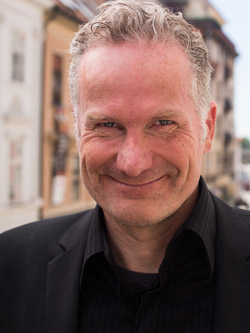
Alec Kinnear
Alec has been helping businesses succeed online since 2000. Alec is an SEM expert with a background in advertising, as a former Head of Television for Grey Moscow and Senior Television Producer for Bates, Saatchi and Saatchi Russia.
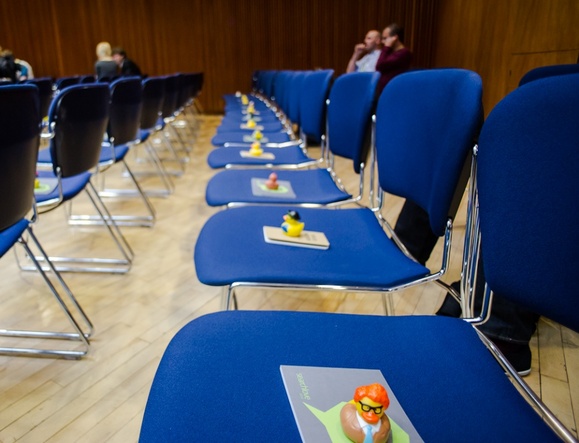
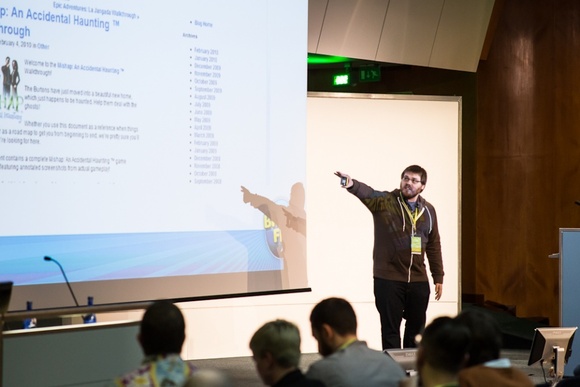
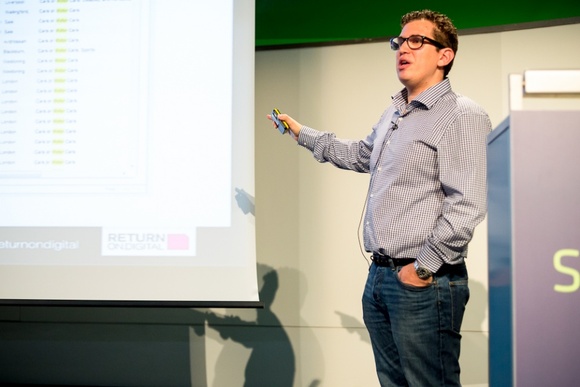
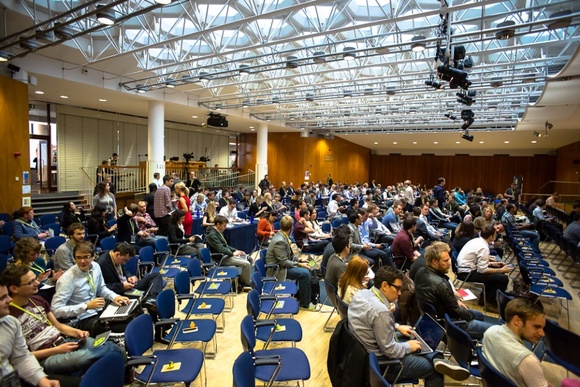
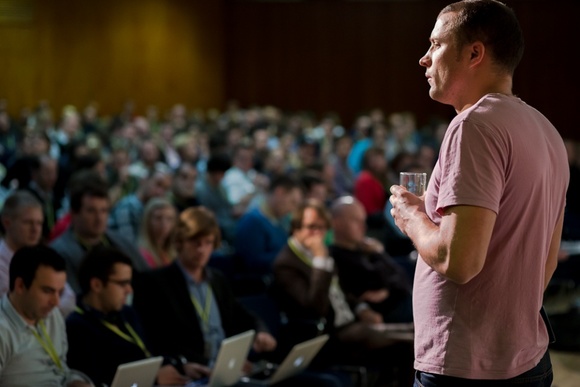
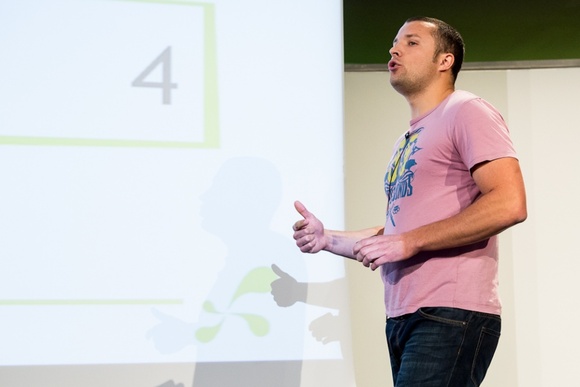
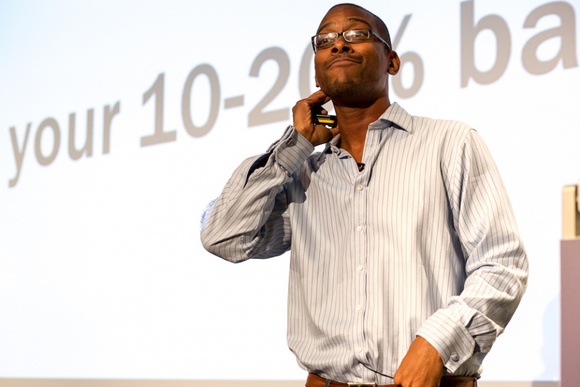
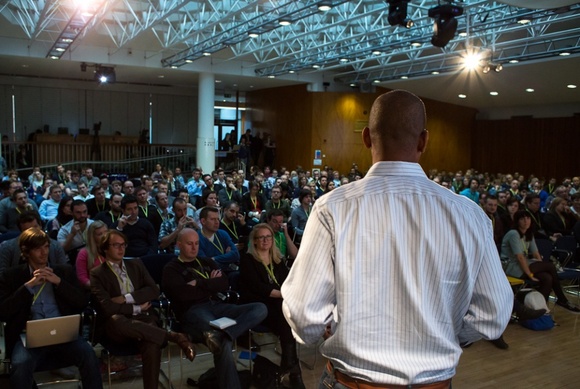
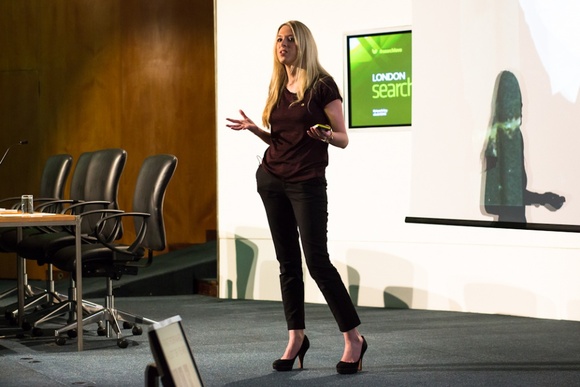
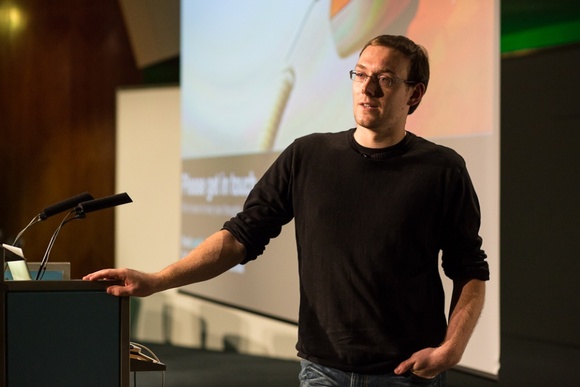
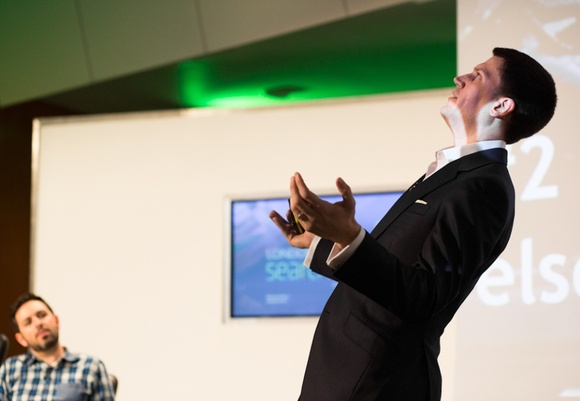
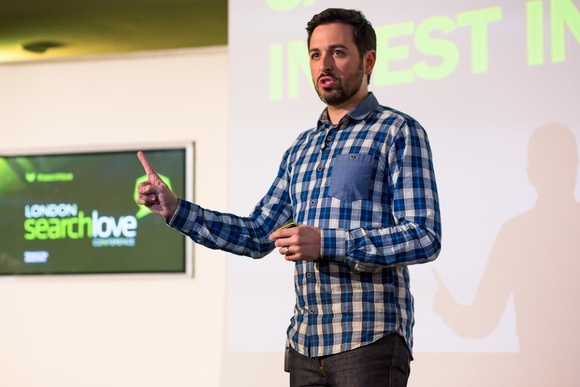

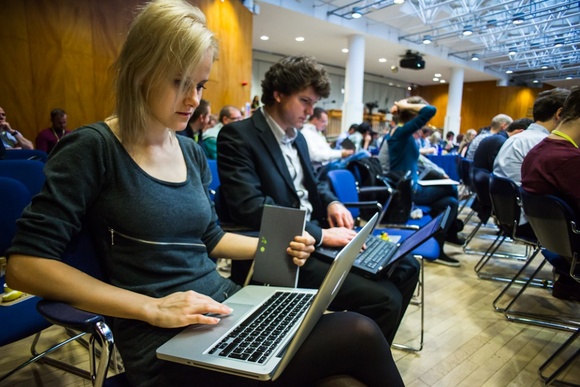
Great Summary of Day One, although I can’t believe you didn’t mention the “Duck of Awesomeness”.
Will you be summing up day two?